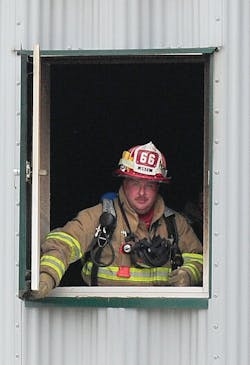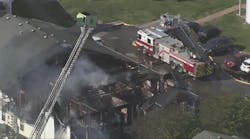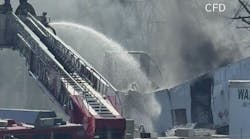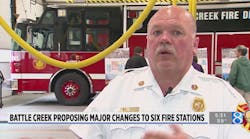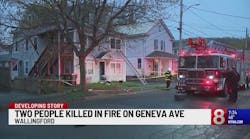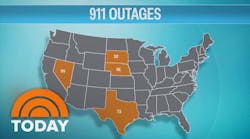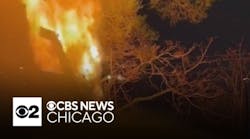On Sept. 25, 2011, Lieutenant Keith Rankin, 38, of the Lancaster Township Fire Department in Lancaster County, PA, suffered a fatal cardiac emergency while participating in a live-burn exercise at the Lancaster County Fire School.
I am very fortunate to know many, many people in our business. Keith was one of those. Several years ago, I had the privilege of teaching with a group of firefighters and chiefs for an organization called Command School Inc., run by Lancaster Township Deputy Fire Chief Glenn Usdin. Glenn and I have been “fire service” friends since the 1970s and Keith was a firefighter on Glenn’s fire department – Lancaster Township. I met Keith through Command School, and that’s how Keith and I became friends. I have met numerous outstanding firefighters over the years, in particular when we taught for Command School. One of them is Deputy Chief Robert R. Devonshire Jr. of Strasburg Fire Company 1, also in Lancaster County.
This close call is about how the line-of-duty death of Keith Rankin saved the life of Bob Devonshire. Our sincere thanks to Chief Devonshire for his interest in sharing this story. Additionally, we offer our continued heartfelt condolences to the members of the Lancaster Township Fire Department, along with the friends and especially the family of Keith Rankin, who even after his passing, continues to make as difference in the lives of firefighters all over the world.
This account is by Deputy Chief Robert R. Devonshire:
On Sept. 25, 2011, the Lancaster County fire and EMS community was shocked to find out that very well-known and highly respected fire officer, Lieutenant Keith Rankin, had a sudden and fatal cardiac emergency while at a live-burn exercise in a fixed Class A burn facility. Along with my brothers, sisters, friends and family, we mourned the loss of Keith.
The loss was sad enough. Then, 131 days later, I found myself lying in the emergency room at Lancaster General Hospital (LGH), staring at the ceiling and wondering why I had AED (automated external defibrillator) pads on my chest and where did all these nurses and doctors just come from.
The flutter in my chest
On Friday, Feb. 3, 2012, I woke up and was lying in bed when I felt a fluttering feeling in my chest. This was not out of the ordinary for me. Over the past few years, I would have this feeling from time to time. The flutter would last two or three seconds and would happen about once every two or three months. I would describe the feeling as if my heart was taking a big gulp periodically. My family doctor indicated this could be normal and to keep an eye on it. I got up, got dressed and headed to work. On my drive into the office, I felt the fluttering again.
My initial thoughts were how strange this was. I had never felt it that early in the day before nor had I felt it more than once a day. I arrived at work – I work full time as a maintenance superintendent for the County of Lancaster – and began my day. About an hour later, I felt a flutter in my chest for the third time and I knew something was not right. I contacted my family doctor to let him know. My doctor was on vacation and another doctor, who was not familiar with me, told me to go to the LGH emergency department and have them run a strip on me to see what was going on.
I left the office and drove myself to the ER, which in hindsight was a really stupid thing to do. By the time I got into an exam room, the fluttering had come and gone about six times since I woke up that morning. The ER nurses had me hooked up to a 12-lead EKG, trying to capture and print my heart rhythm during a flutter. I was sitting upright talking to my nurse, George Scheurich (a brother firefighter), when I felt one start. I remember saying, “I feel one starting,” and George telling me he could see it on the EKG. The next memory I have is lying flat on my back and looking at the ceiling.
George asked me if I was OK and I said I was. He then asked me if I knew what had happened and I said I did. But then I began to look around and I saw the room was full of nurses and doctors who were not there what seemed like a second ago. As I continued to look around, I noticed I had AED pads on my chest that I did not remember being there before. I asked George, “Did you shock me?” He said no, but “I did give you a cardiac thump.”That’s when I knew something bad had just taken place.
In the hospital
Over the next seven days, I took up residency in the Intermediate Intensive Care Unit (IICU) while they ran tests. I went through a heart catheterization to check my coronary arteries and heart muscle, of which everything was in great shape. My cardiologist, Dr. Ward Pulliam, felt the problem was that of an electrical problem in my heart. He ordered a cardiac MRI and a second heart catheterization to perform a catheter ablation; a process where they find the cells in my heart that are misfiring and causing the bad rhythm and then they essentially destroy the bad cells.
After two days at LGH, the doctors felt confident that what was causing the fluttering in my chest was a problem called accelerated idioventricular rhythm (AIVR). This is when the ventricles (bottom chambers of the heart) beat faster than the atria (top chambers of the heart) for at least three consecutive heartbeats. Not fast enough to be considered ventricular tachycardia (V-tach), but too fast to be an effective heartbeat. The fluttering I was feeling was a string of heartbeats in AIVR.
While at LGH, I experienced strings of 20-plus heartbeats of AIVR, one of which was during my time in the ER when I went unresponsive and received a pericardial thump that brought my heart back into a normal rhythm. A pericardial thump is a bit of an old-school technique when a properly trained person, such as a paramedic or doctor, uses their fist to strike a person experiencing symptoms like I did in the center of their sternum. This force can generate about two to five joules of electrical current to the heart and restore a normal rhythm. Generally speaking, this is done during a witnessed cardiac arrest or V-tach.
After all of the tests and the ablation, my symptoms have diminished to an acceptable level and I should have a normal life. My only restriction has been a tough one to swallow – I am no longer allowed to take part in interior firefighting activities. My brain tells me it’s the right thing and I understand why, but my heart has a different opinion. I’m listening to my brain and my doctors and following this one no matter how tough it is.
I have shared this with my brothers and sisters in the firehouse and they are all looking out for me and have been very supportive and understanding. As one friend put it, “You are my lifeline when I go in. Your role and knowledge protects me. I trust your knowledge and experience. I need you to watch my back.” I will continue as a command-level officer as well as an instructor.
How Lieutenant Rankin saved my life
When Lieutenant Rankin died in September, I really took a hard look at my health. Lieutenant Rankin was a few years younger me and we were alike in a lot of ways. I found myself not in the best shape of my life by a long stretch. I was more than 100 pounds overweight and I had high blood pressure and high cholesterol. My physical activities were minimal.
I completed a 110-floor stair climb on Sept. 11, 2011, to commemorate the 10th anniversary of the attacks on the World Trade Center. Although I had a lot riding against me, with some training beforehand I was able to complete the stair climb. Over the next few weeks, I kept walking at a local track with a group of friends. We would meet and just walk and talk and little by little I was slowly improving my health. In January 2012, I joined a local YMCA and began to work out even more. I set two goals for myself this year – to lose 50 pounds and run a five-kilometer race. At the Y, I run the treadmill, do the stair-climb machine, ride the stationary bike and use the weight machines. Since January 2012, I have already lost eight to 10 pounds.
After Lieutenant Rankin’s death, I started to pay much closer attention to my personal health and began to make changes for the better. I also started to listen harder to what my body was telling me. I am totally convinced that if the events of Feb. 3 had happened six months earlier, I would have ignored the fluttering and kept on about my day and more than likely I would not be here today.
To say I am forever grateful to Lieutenant Rankin would be an understatement. He saved my life.
Lessons learned
Several things jumped out at me while spending a week in the hospital following my incident. I need to share them in hopes others will save themselves from preventable health emergencies:
• See your doctor. Before you start anything, see your doctor and get a physical. This is the best way to find any underlying issues you may not be aware of – high blood pressure, high cholesterol, diabetes, obesity, cancer, Crohn’s disease and so many more health issues can be detected easily and treated. Many can be fatal if left unchecked.
• Eat healthy. Watch what you eat. Less fried food, less salt, less caffeine and more fruits, vegetables, grains and proteins. Remember, garbage in equals garbage out. Portion control is also an easy way to curb your intake of calories. Simply eating healthier will make a tremendous positive impact in your life. You will feel better and subsequently be healthier.
• Get active. Be active at least 60 minutes a day, three or four days a week. Go for a walk, join a gym, ride a bike and take the stairs instead of riding the elevator (or get off the elevator two floors early and walk the rest of the way). Anything helps. The point is to get your heart beating, your feet moving and your body will respond.
• Listen to your body. This, to me, is one of the most important lessons I learned. Had I not listened to what my body was telling me and sought out advice from a doctor, I would probably not be here now. Your body will speak volumes to you; all you need to do is listen and then act.
I am alive today because of the line-of-duty death of Lieutenant Keith Rankin. Because I made a conscious decision to change my lifestyle. Because I listened to my body and called my doctor. And because when it all went bad, I was in the ER at the right time with the right people beside be.
Be aware of your health and take care of yourself. Listen to your body. You may only have one chance to do this right.
